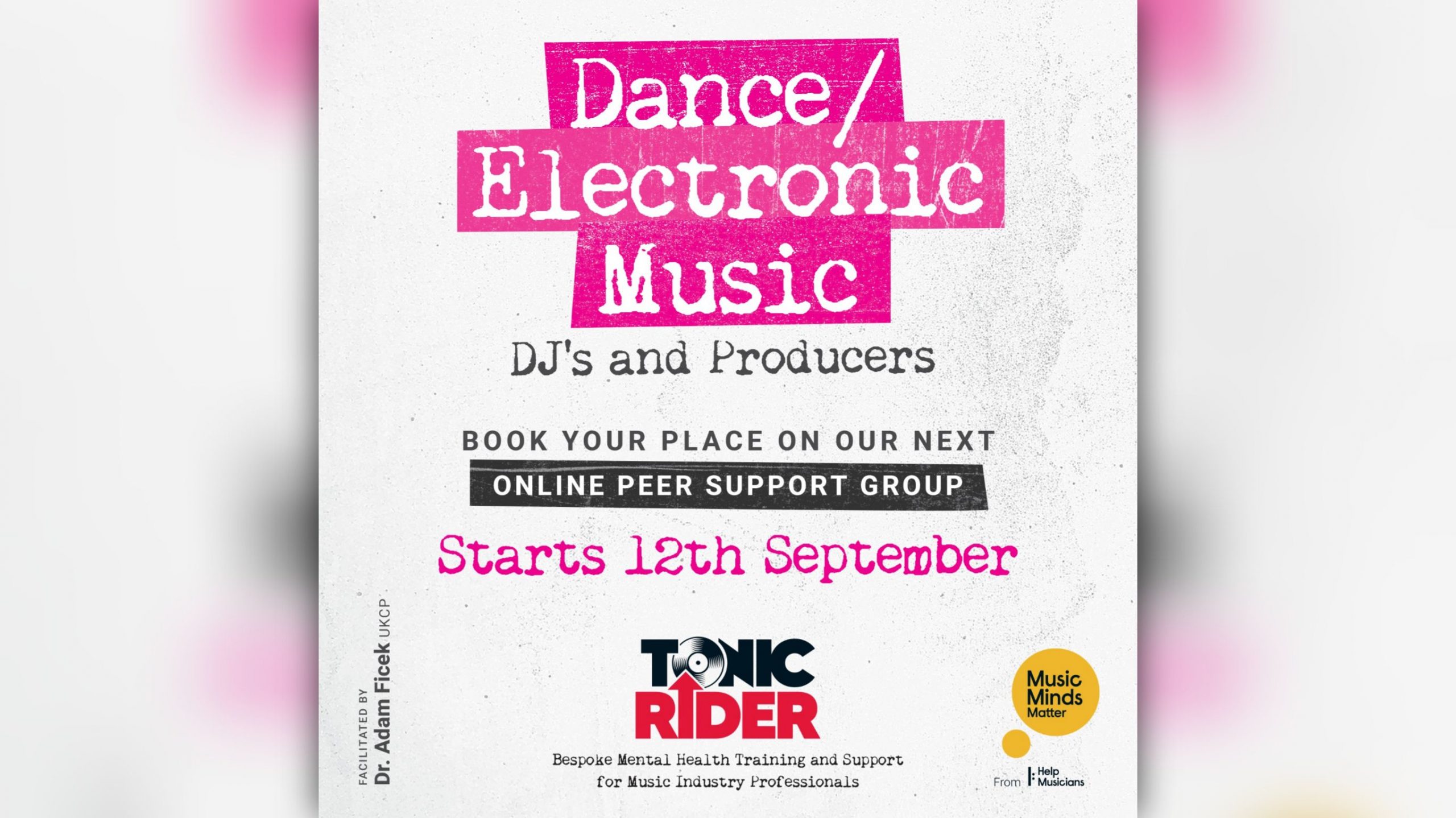Tonic Music is launching the Dance / Electronic Music Peer Support Group. An open space exclusively for DJs and producers working in dance / electronic music to discuss and share their experiences of mental health and the music industry. Tonic Rider in partnership with Help Musicians / Music Minds Matter are providing a six-week online Peer Support Group exclusively for DJs and producers working in dance / electronic music. The first session starts on the 12th of September. You can find more information here. We spoke to Tonic Music’s Programmes Lead, Jeordie Shenton to get more insight into the six week support group.
1. What inspired Tonic Music to create a peer support group specifically for DJs and producers working in dance and electronic music?
This Peer Support Group is one of several Tonic Music are facilitating with the support of Music Minds Matter. The dance and electronic music industries, and more specifically DJs and producers, were identified as a population in need of an exclusive Peer Support Group. Last year the Musicians’ Union and Help Musicians (the partner charity of Music Minds Matter) conducted the Musicians’ Census, which revealed of all genres, dance musicians reported the highest rate of low mental wellbeing. At the same time, over the past 3 and a half years of providing the Tonic Rider programme, DJs and producers working in dance / electronic music are a population experiencing unique occupational stressors.
2. Why do you believe mental health support tailored to the dance and electronic music community is important, and how does it differ from other support programmes?
For many DJs and producers, poor mental health can be exacerbated by social isolation and late night work hours. Although these stressors are encountered by many musicians, the culture of dance and electronic music industries means experience in the extreme – for instance, more instances of working alone in the studio, more instances of working in the early hours when performing. This is combined with typical pressures to release new music and go on tour, which also leads to a lack of nutrition, poor sleep and problematic substance use.
3. Can you explain how the format of the six-week online group will function and what participants can expect to gain from attending?
All of the Peer Support Groups employ the same structure, as a series of six 90 minute sessions, facilitated every week via video call by a psychotherapist with significant experience working in music. There are no set topics for the Peer Support Group, but with all participants being DJs and producers working in dance and electronic music, the discussions will naturally revolve around the stressors of working in these occupations and industries. Participants can expect to gain the benefits of sharing their experiences with peers in a safe, confidential and non-judgemental space. This can also lead to participants attending the weekly Drop-In Group, along with forming their own messaging groups with fellow participants.
4. With the limited number of spaces available, how are you ensuring that participants can commit to the full six weeks and gain the most from the sessions?
To attend any of the Peer Support Groups, all participants need to complete a registration and attend a consultation appointment with a member of the Tonic Music mental health team. This in itself requires a certain amount of dedication, which helps ensure participants attend most of the sessions – taking into consideration many freelancers will receive last-minute work opportunities (and therefore, miss a session). In addition, up to 15 participants are booked onto the Peer Support Group to mitigate the effects of non-attendance.
5. Can you tell us more about Dr. Adam Ficek’s role as the facilitator of the group and how his background in both psychotherapy and music enhances the experience for participants?
Adam has been a facilitator of the Peer Support Groups since they started in 2021, and continues to facilitate the majority of the groups – including the Open, ADHD and Drop-In Groups. As a UKCP accredited psychotherapist who continues to work in music as a performing/recording artist, songwriter, DJ and teacher; Adam ensures there is empathy and understanding through first-hand experience. Alongside this, Adam recently completed a doctorate researching the mental health of musicians, which I believe was the first in the UK. Altogether, Adam is an amazing facilitator, not only informed by the expertise outlined, but also his compassion and kindness.
For the full details, including how to apply and dates, click here.
Tonic Music Socials


